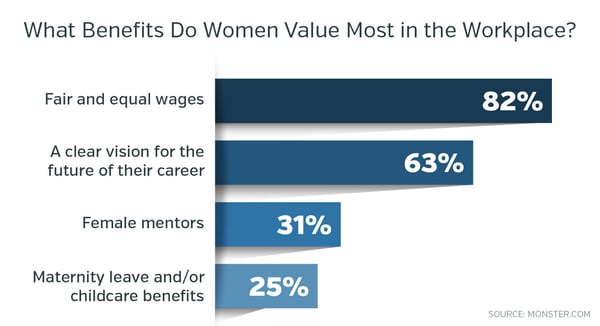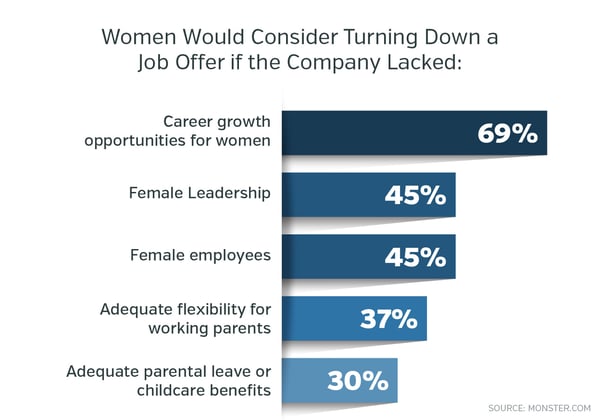Nearly everyone who is employed is looking for or plans to look for a new job this year, says Monster.com which regularly polls workers. The job seekers want more money, are unemployed, or say there is no room for growth in their current role.
Workers are unhappy—even in an economy which is seeing more than its share of layoffs: Just 36% of employees say they are engaged at work.
What would make workers happier? A company culture that encourages feedback, goal-setting, and learning is one factor, say HR leaders.
Another recent Monster poll takes a closer look specifically at what women want from the workplace, which can be different from what men want. We take a deeper dive to try to figure out precisely what women working in technology seek from their jobs.
What women value at work is important because “ensuring businesses make strong commitments to gender equality and introduce female-friendly policies is not only the right thing to do, it’s also key to staying ahead of the competition,” says Claire Barnes, Chief Human Capital Officer at Monster.
What do women value at work? What are women in tech looking for from their jobs?
1. Equitable Pay
While a majority (82%) of women say “fair and equal wages” is the benefit they value most in the workplace, only 24% of women believe that men and women are paid the same where they work.
In tech, specifically, men are offered higher salaries than women for the same job title at the same company 59% of the time, according to a 2021 survey from Hired. On average, women in tech are offered salaries 2.5% less than the ones that men are given for the same roles.

2. Growth Opportunities
Two-thirds (63%) of women value “a clear vision for the future of their career,” and 69% of women would consider turning down a job offer if the company lacked career growth opportunities for women, Monster says. Only 23% of women think all employees at their current company receive the same quality and quantity of opportunities.
In tech, “we know how important it is for younger women to see that progression is possible,” says Christie Struckman, Vice President Analyst at Gartner. “Let them see you and feel your impact by being a vocal champion of making change happen in your organization.”
It’s important to focus not just on recruitment but on retention and “a pipeline view of the lifecycle of female employees in their workplace,” Struckman says. Women also see bias in promotion, with 40% noting it.

3. More Women Role Models
The Monster poll finds that 31% of women say they value female mentors in the workplace, and 45% would consider turning down a job offer if the company lacked either female leaders or female employees.
In tech, Deloitte Global predicts that large global technology firms, on average, will reach nearly 33% overall female representation in their workforces in 2022, up slightly more than two percentage points from 2019. Although the shares of women in tech and leadership roles have tended to lag the overall proportion of women by 8‒10 percentage points, they are increasing.
4. More Flexibility
A quarter of women say they value maternity leave and/or childcare benefits, according to Monster. Thirty-seven percent say they’d consider turning down a job offer if the company lacked adequate flexibility for working parents, and another 30% say they might walk for lack of adequate parental leave or childcare benefits.
In tech, women executives prioritize flexibility when contemplating joining or remaining with a company, with 48% citing it as one of the top three considerations in a WomenTech Network survey. Men leaders are slightly less likely to include this factor in their decision-making process, at 34%. Women executives are 1.5 times more likely than their male counterparts to have changed jobs because they desired a workplace that was dedicated to diversity, equity and inclusion.
What women in tech want from the workplace matters. More women in tech drive innovation—and they drive impact and revenue. Research by the Peterson Institute for International Economics which has reached out to more than 22,000 firms worldwide, finds that companies that are more gender-diverse are more profitable: Companies with a 30% female share experienced a 15% increase in profitability compared to those with little or no gender diversity. More revenue means more profit--and in the tech field, it also means more funding for research and development, which benefits us all.














